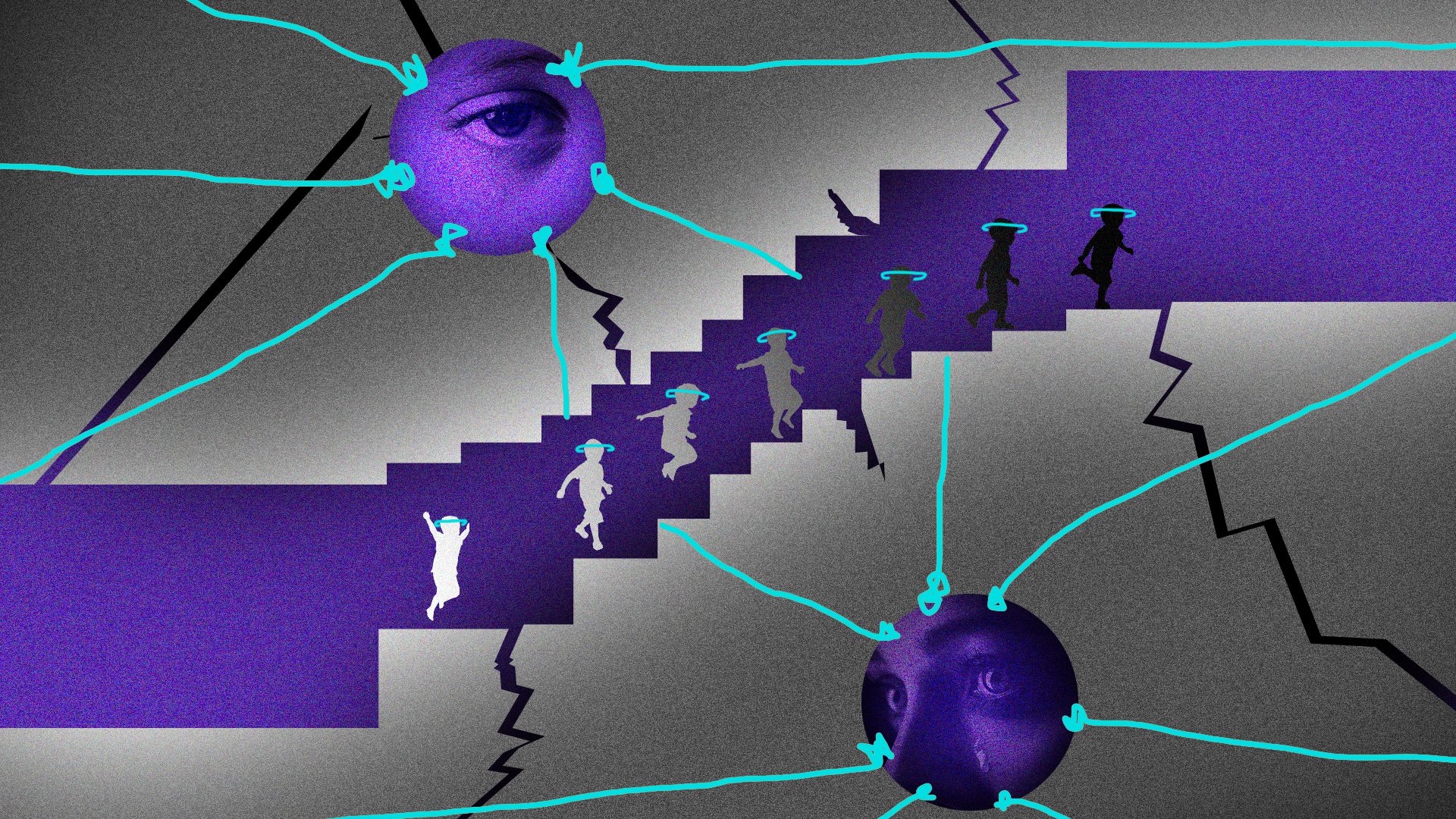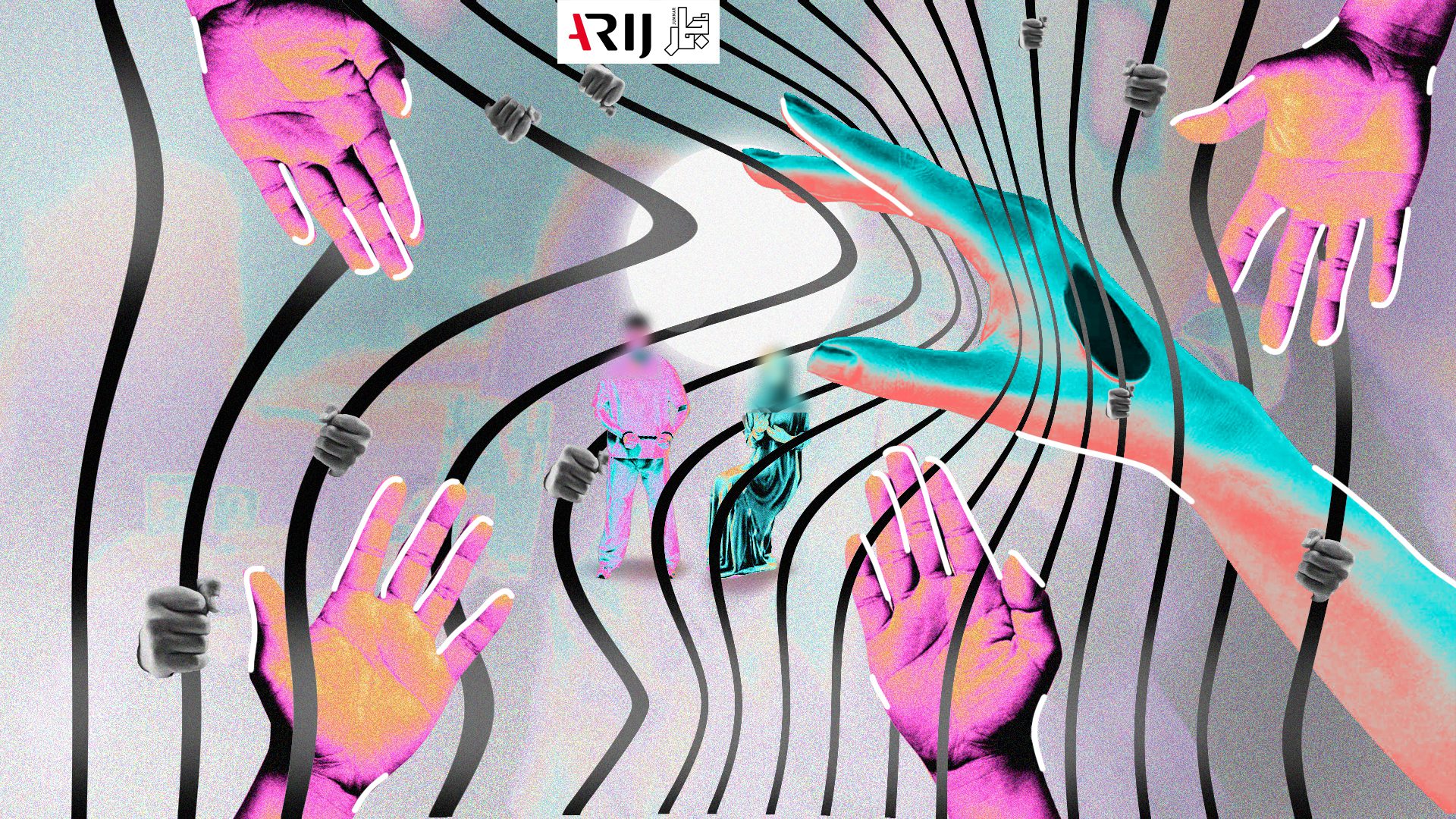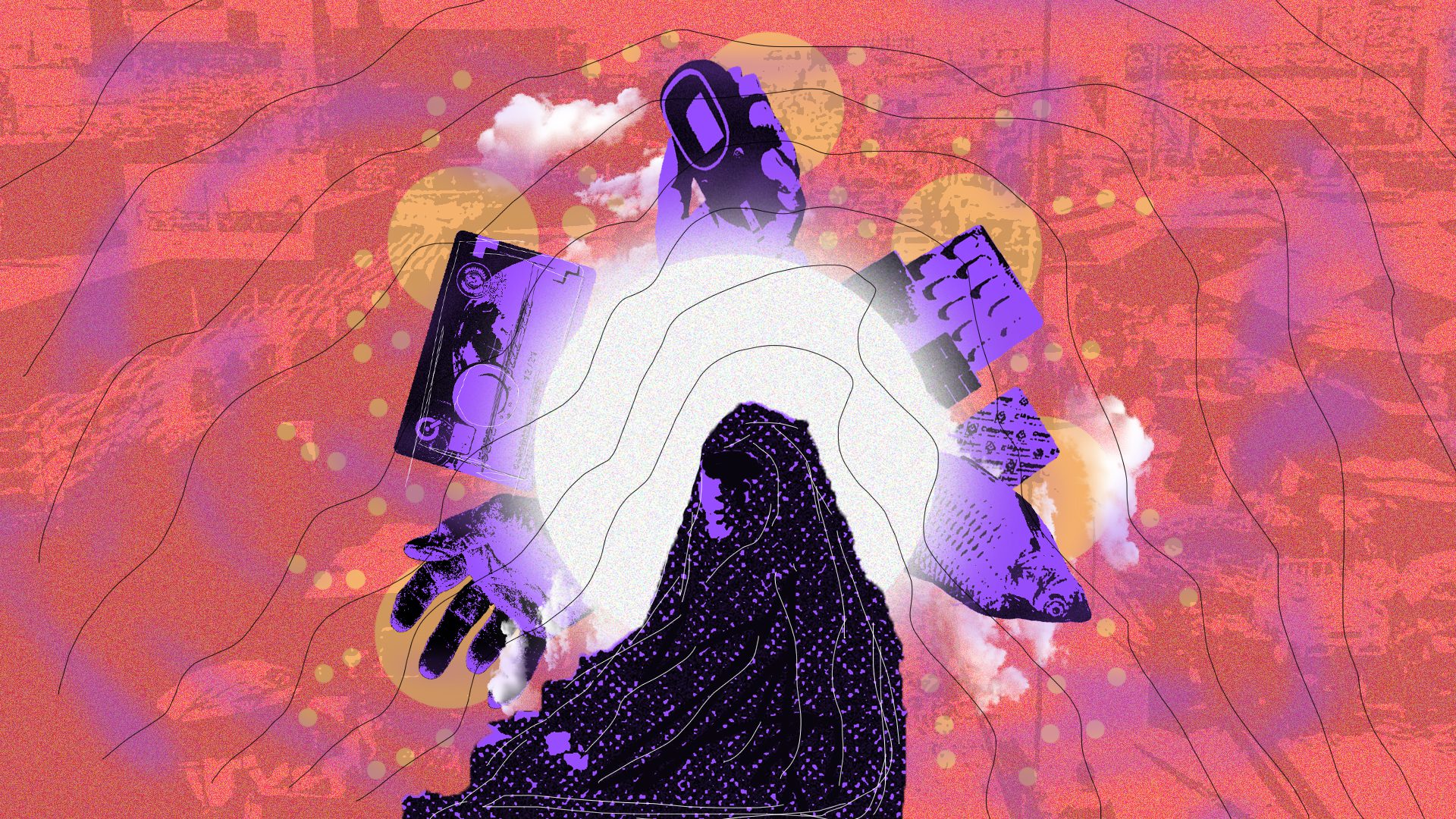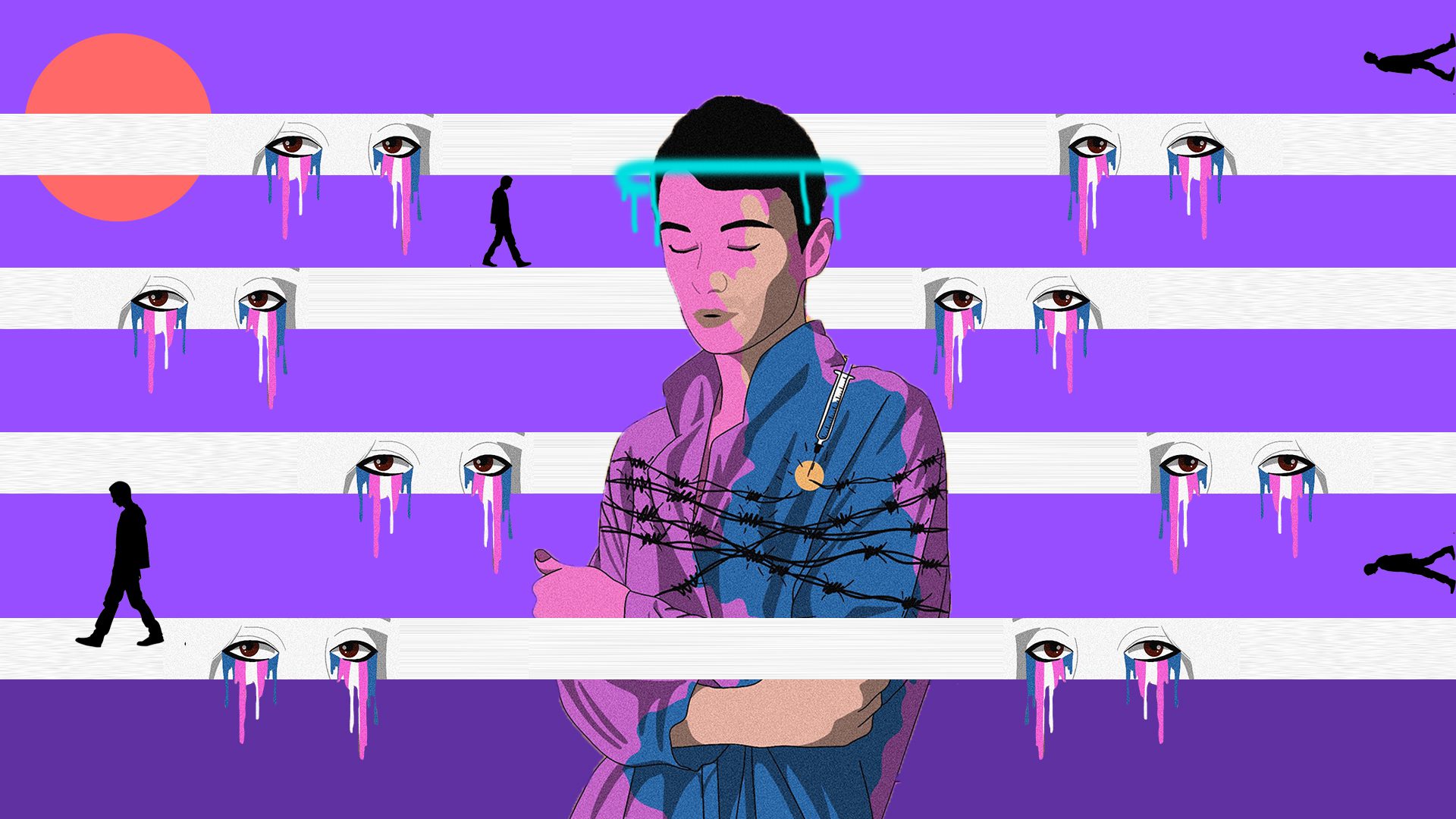“She Brought a Fatwa from Khamenei and Al-Azhar, But It Went Nowhere”: The Struggles of Trans People in the Iraqi Health Sector
13 Mar 2024
Trans people experience structural violence in Iraq’s health sector, from what is taught in universities to the practices of doctors in hospitals. Most college professors ignore trans issues, and only incite hatred towards trans people if they discuss them at all.. the struggles of trans people in the Iraqi health sector - from its halls of power to its policies.
“They want me to be a veiled girl, to act in a feminine way, and to focus on men, marriage, etc… This is not so uncommon in Iraqi families, but as time passes it hurts me more and more…”, says Ghaith (19 years old), a trans man from Baghdad.
Many trans men and women in Iraq live in bodies that do not match their feelings towards their gender identity. They try to break free from these bodies through gender-affirming treatment, which can be done through hormone replacement therapy, surgery, or both. However, this type of treatment is not available in Iraq, where the rights of trans people and the broader LGBTQ+ community remain unrecognised. These individuals live in constant fear of familial and societal abuse, and the suffocating feeling of not being able to be their true selves.
Being trans is neither a disorder nor an illness
Transgender and transsexual are defined as correcting one’s gender identity from male to female or the reverse. This can be achieved with or without medical intervention, for example taking hormones or undergoing surgical operations.
Being transgender is often confused with being homosexual. While the latter indicates the person’s sexual orientation and attraction towards people of the same sex or gender, being transgender refers to the individual’s sense of self and the feeling of belonging to a gender identity that differs from the one in which they were born. At the same time, many trans people identify as part of the LGBTQ+ community, since they have a non-stereotypical gender identity and expression.
Despite the fundamental differences in these definitions and what they mean for the daily lives of individuals, confusion and misunderstanding puts trans people in Iraq under constant threat due to the misleading information circulating about these terms. In recent months, various authorities have confused the terms “gender” and “transgender”, with the latter being particularly singled out. Religious and political figures called the word “transgender” an attempt to “blur the line between the two sexes” (as described by cleric and politician Ammar Al-Hakim), and consequently imposed a ban on the use of the term “gender” by public institutions and media.
For many years, the term “gender identity disorder” (the distress a person experiences due to a mismatch between their gender identity and their biologically assigned sex) was included in the classification list of the International Classification of Diseases (ICD) as a mental disorder, with gender-affirming surgeries considered to be the cure. This remained the case until the World Health Organisation (WHO) updated the eleventh edition in 2019, in which it redefined the term “gender identity disorder” and replaced it with “gender incongruence”, as well as moving it from the “Mental and Behavioural Disorders” chapter to “Conditions Related to Sexual Health”.

Human Rights Watch called this change an “important development for transgender adolescents and adults, who may soon be able to seek medical care without being viewed as ‘mentally disordered’”. Four years after the removal of trans from the list of illnesses however, trans people still struggle with the health sector in order to access medical supplies and address other needs, such as hormonal therapies, etc. This is more detrimental in countries with crumbling healthcare systems, such as Iraq, which was ranked last out of a hundred in the healthcare systems index of 2023.
Moreover, trans people in Iraq also face discrimination, hatred, and physical violence. Their desires and need for sexual or gender affirmation are not just a health condition that requires the state’s care or support, even if through legal regulations. Rather, authorities on the political, religious, and social levels consider them an ‘aberrant, odd group with a Western agenda that aims to destroy the family institution and society’.
This means there is a lack of data on trans people in Iraq, along with all LGBTQ+ community members, leading to uncertainty about their numbers and the assessment of their medical and psychological needs. This also undermines the need to explain how the transitioning process is undertaken, which deepens the threat to trans people along with the social risks that surround them due to their desire to transition.
The process of gender transition in Iraq…Where is the legislation?
Iraqi legislators do not explicitly address transgender issues in Iraqi law. Therefore, no law that specifically recognizes the rights of trans people to undergo gender-affirming surgery, and thus regulate the process. The main question posed by trans people is whether it is legal to undergo such surgery in Iraq, and if allowed, is the state responsible for providing the medical care?
Article 46 of the Iraqi Constitution (2005) states that “restricting or limiting the practice of any of the rights or liberties stipulated in this Constitution is prohibited, except by law or on the basis of law, and insofar as that limitation or restriction does not violate the essence of the right or freedom”. Despite not directly addressing the right to transition, some legal specialists use this article to conclude that gender-affirming surgeries are a part of an individual’s right to healthcare and that the state must provide the necessary medical support. Ambiguity still surrounds whether gender-affirming surgeries are considered medical operations related to the constitutional right to health, and the question of its permissibility by shariah law also remains unclear.
Another legal opinion holds that constitutional rights are governed by Article 2(A), which prohibits enacting any law that contradicts the established provisions of Islam. Thus, the presence of a religious Fatwa (ruling) or documents issued by a religious authority could negate the restrictions mentioned above, according to a lawyer Jummar interviewed who preferred to remain anonymous. In fact, some Shiite religious authorities, as well as Sunni ones at Al-Azhar, consider transitioning or gender affirmation to be a medical issue or an illness, which makes it permissible in some cases, and so provide religious documents or official rulings for trans people.
However, several trans people have been unable to receive the necessary hormonal therapy in Iraq despite obtaining such religious documents from the office of Ali Khamenei, the Ayatollah and the Supreme Leader in Iran, or Al-Azhar in Egypt.
Samar (19 years old), a trans woman from Baghdad, tells the story of her transgender friend, “I have a friend who obtained an official document from the office of Khamenei in Iran permitting this matter (transitioning), as well as a permit from Al-Azhar in Egypt. She was able to do what she wanted after seeking mediation from high-profile military officers in Iraq. She had to go through all of this just to be able to get a medical prescription for hormones from a doctor so that she could easily buy them from any pharmacy. It worked for the first three times, then she travelled to Iran for the surgery, and it was hard for her to come back. She was here in Iraq for a few months and then went to Turkey, planning to be smuggled into Italy. No one has seen her since or knows what happened to her”.

Currently, there is no clear law regulating gender or sex affirmation, only protocols concerning “sex correction” issued in 2002 by the former regime’s Ministry of Health. The procedures include a long and complex series of examinations and evaluations to be carried out by medical and psychological committees before obtaining approval for sex correction. This includes a psychological evaluation, a clinical examination of the external genital organs, and then an examination of reproductive organs, hormones, chromosomes (DNA), etc.
These protocols are based on WHO’s past description of the desire to transition as a “disorder”, categorising trans people as “mentally disordered”. It therefore stipulates that if the clinical and psychological evaluations prove that the case results from a gender identity disorder, then the patient is referred to an initial psychological committee, and then a psychological appeals committee. Once the committee approves the correction process, the individual will be subjected to a “rehabilitation therapy program for a period of time determined by the committee in order to adjust to the correction”.
It is unclear whether these protocols are still being followed and carried out, which further complicates the existing difficulties faced by individuals seeking gender affirmation. Furthermore, labelling them as mentally disordered makes it nearly impossible for trans people in Iraq to access the healthcare they need, or to make gender affirmation a right guaranteed by law.
An anti-transgender healthcare system
The Ministry of Health’s protocols on sex correction (2002) stipulate that different specialities require intervention in evaluating the correction request, including urology, obstetrics and gynaecology, psychiatry, and cytogenetics. The psychological evaluation is one of the first steps required to initiate the transitioning process. However, trans people often encounter a major obstacle when dealing with psychiatrists – and are often met with hatred – making psychiatrists unwilling to offer support. Additionally, it remains unclear whether the Iraqi Psychiatrists Association has a medical stance towards LGBTQ+ community members.
“If they refer you (in the healthcare system) to a psychiatrist, he (the psychiatrist) prolongs the sessions’ timeline to make more money, prescribes you antidepressants, and doesn’t make getting a medical report easy…”, says Muhammad (twenty-six years old), a transgender man from Basra. As for Mayar (twenty-three years old), from Najaf, the psychiatrist asked him to bring his family along in order to get a report!
Nour (20 years old), a trans woman from Baghdad, had a similar experience, “I know the health sector here well. From my experience with them, if we talk to them about it (transitioning), they would either say ‘Okay’ and then try to distract us from it, avoid talking about it directly, or try to convince us that it’s a strange idea. That it’s wrong”.
It is not only trans people that experience a lack of professionalism by psychiatrists. Doctors confirm it as well. A psychiatrist (who preferred to remain anonymous) pointed out that despite the professional oath to treat individuals without discrimination, some psychiatrists “are affected by social pressure, a prevailing negative view, and the unjustified fear of this group, which spreads homophobia, genderphobia, or transphobia among them”.
A psychological evaluation is followed by examinations conducted by a medical committee. However, it is very difficult – most trans people consider it impossible – to reach this step-in practice, except for the cases diagnosed as “genital malformation”, which they consider a medical condition rather than a “mental disorder” as in the case of trans people.
Trans people experience structural violence in Iraq’s health sector, from what is taught in universities to the practices of doctors. Most college professors ignore trans issues, and only incite hatred towards trans people if they discuss them at all. This has established a healthcare system that perpetuates hate towards s members of the LGBTQ+ community in Iraq. Therefore, medical university education can be considered among the most prominent causes preventing trans people from accessing the healthcare they need.
Hayden (twenty-one years old), a medical college student from Najaf, confirms this, “In fact, they never mentioned the issue of trans people throughout my studies, as if those people do not exist among us. It only happened one time during my third year in a lecture on maternal and newborn health (“family varieties”), which included families of same-sex parents with children. The professor started talking about this issue, which she called “the homosexual agenda”, saying that it doesn’t exist in our country but only in the West and that it’s being heavily advertised. She added that trans people do exist, but they only do it to earn fame, because there are older married people who come out as trans, and that’s why she thinks it’s blown out of proportion”.
Heather (twenty years old), a gender non-binary person from Najaf working in the health sector, adds that professors use offensive jokes to teach their scientific material. Her professor once stressed in a statistics class saying that “there are only males and females in this lecture hall. There is no third gender here”.
“Proceed at your own risk”… the dangers of hormone therapy in Iraq
All of this demonstrates how the health sector often slams its doors on trans people in Iraq, forcing them to seek alternative ways to transition. The most prominent alternative is hormone therapy, which is difficult to access through doctors. The only option for trans people then is to use hormones without supervision or guidance, putting their lives at risk.
Aaron (twenty-seven years old), a transgender neurologist working in the Iraqi health sector, says that trans people require hormone treatment, and a deeper understanding and awareness in the health field. He adds that “it’s difficult for them to access hormone dosages, unless it’s through a friend or family member who works in the health sector and understands their situation. Otherwise, it would be impossible”.
Trans people need access to hormones in order to undergo the transitioning process. The dosage must be medically supervised as it can cause serious side effects that can lead to death. Still, doctors refuse to issue medical prescriptions for the required hormone dosage, leading trans people to seek them from other places and in irregular doses.
According to Kadi (twenty-three years old), who spent the last four years in Iraqi Kurdistan, these difficulties are not limited to Iraq but are also faced by trans people in the Kurdistan Region, which is usually understood to provide more individual freedoms.
“Accessing hormones with a medical prescription is next to impossible unless you know someone who can forge a prescription for you. As transgender men, we rely on online sports websites that sell male hormones illegally. We exchange information about dosages and other related issues. But still, it’s at your own risk”, says Muhammad.
As for female hormones, Heather says that transgender women use hormonal contraceptives, such as DIANE-35, and menstrual regulators, since they are sold without prescriptions.
Heather, who works in the health sector, says that there is no system or protocol in Iraq regarding the hormonal dosage required for transitioning, as well as no instructions available in Arabic to inform people what the right dosage is, how it should be used, the risks it poses, and its possible effect on physical and psychological health. Even the instructions in English are written in a scientific language that is hard to understand for non-medical specialists. Additionally, these hormones often interact with other drugs that the individual might be taking at the same time, which may exacerbate health conditions of trans people.
In addition to its effect on physical health, taking hormones without medical supervision and from unauthorised sources poses a threat to trans people’s mental well-being, as certain dosages may be carcinogenic, or worse. In addition, some cases showed no significant effect due to poor-quality treatments manufactured by unprofessional companies, but trans people hang their hopes on such products to achieve even the slightest changes. If these changes don’t happen, it leads to deterioration in their mental health, says Dr. Aaron. “I had a transgender friend who bought male hormones from a gym. When he didn’t get results, he committed suicide”, he added.
On top of all that, trans people bear a heavy financial burden in paying for these hormones, as the average price of a single dose of the female hormone ranges between six to nine thousand dinars (about 5-7 US dollars), while the prices of the male hormone range between thirty-five to seventy-five thousand dinars per dose (about 27-57 US dollars.) This can really add up if the person takes them continuously, which is usually the case, as low dosages have minimal impact on sexual characteristics.
As a result, some trans people consider undergoing body-sculpting surgeries and changing some of the features of their bodies using silicone to achieve gender identity change. This is more popular in the Kurdistan Region where plastic surgery clinics perform some surgeries on trans people. These surgeries however are expensive, as one surgery can cost up to 2500 US dollars. If they can undergo sex-affirming surgeries in other countries, such as Iran, it can cost tens of thousands of US dollars, according to Souleen (twenty-eight years old), a trans person from Basra.
Continuous estrangement
Even if trans people are able to access medical means to transition, and can afford it, another equally important obstacle remains in the way: their family’s reaction to their experience. Some trans people are reluctant to take hormones because taking them consistently over long periods of time can lead to noticeable physical changes in the long run, which leads to conflicts with the family that can go as far as murder. This is what Mayar (23 years old), a trans man from Najaf is afraid of. He decided not to take hormones and says that he fears for his life if his family found out, as they would prevent him from pursuing the process or possibly even kill him.

Violence affects many trans people, and they carry its traces on their bodies and within their souls, such as Souleen, who was beaten by her family with an electric cord, leaving its marks on her back.
If trans people decided to comply with the restrictions of the health sector, family, and society, it would lead to the deterioration of their mental and physical health. Trans people are forced to live a conventional life that matches their biological sex, not the gender identity they identify with and see themselves in.
This is the continuous estrangement of Iraqi trans people, with the lack of proper medical care and the recognition of their rights and freedom to be themselves in a society in which all levels of authority, the family, the tribe, and the state, continue to tightly control an Iraqi’s life, no matter who they are.
**Pseudonyms were used in this article.
Read More

“His gaze was intrusive; it pierced my soul”: On the Struggles of Divorced Women in Navigating Courts and Governmental Institutions

“Everyone has a Right to the Kids Except their Mother”: On Women Fighting for the Custody of Their Children

Iraqi Prisoners Blackmailed to Pay To Obtain Release Papers After Completing Their Sentence

“We Have to Make a Living Somehow”: Women Working Hard under the Heat of Dhi Qar
“They want me to be a veiled girl, to act in a feminine way, and to focus on men, marriage, etc… This is not so uncommon in Iraqi families, but as time passes it hurts me more and more…”, says Ghaith (19 years old), a trans man from Baghdad.
Many trans men and women in Iraq live in bodies that do not match their feelings towards their gender identity. They try to break free from these bodies through gender-affirming treatment, which can be done through hormone replacement therapy, surgery, or both. However, this type of treatment is not available in Iraq, where the rights of trans people and the broader LGBTQ+ community remain unrecognised. These individuals live in constant fear of familial and societal abuse, and the suffocating feeling of not being able to be their true selves.
Being trans is neither a disorder nor an illness
Transgender and transsexual are defined as correcting one’s gender identity from male to female or the reverse. This can be achieved with or without medical intervention, for example taking hormones or undergoing surgical operations.
Being transgender is often confused with being homosexual. While the latter indicates the person’s sexual orientation and attraction towards people of the same sex or gender, being transgender refers to the individual’s sense of self and the feeling of belonging to a gender identity that differs from the one in which they were born. At the same time, many trans people identify as part of the LGBTQ+ community, since they have a non-stereotypical gender identity and expression.
Despite the fundamental differences in these definitions and what they mean for the daily lives of individuals, confusion and misunderstanding puts trans people in Iraq under constant threat due to the misleading information circulating about these terms. In recent months, various authorities have confused the terms “gender” and “transgender”, with the latter being particularly singled out. Religious and political figures called the word “transgender” an attempt to “blur the line between the two sexes” (as described by cleric and politician Ammar Al-Hakim), and consequently imposed a ban on the use of the term “gender” by public institutions and media.
For many years, the term “gender identity disorder” (the distress a person experiences due to a mismatch between their gender identity and their biologically assigned sex) was included in the classification list of the International Classification of Diseases (ICD) as a mental disorder, with gender-affirming surgeries considered to be the cure. This remained the case until the World Health Organisation (WHO) updated the eleventh edition in 2019, in which it redefined the term “gender identity disorder” and replaced it with “gender incongruence”, as well as moving it from the “Mental and Behavioural Disorders” chapter to “Conditions Related to Sexual Health”.

Human Rights Watch called this change an “important development for transgender adolescents and adults, who may soon be able to seek medical care without being viewed as ‘mentally disordered’”. Four years after the removal of trans from the list of illnesses however, trans people still struggle with the health sector in order to access medical supplies and address other needs, such as hormonal therapies, etc. This is more detrimental in countries with crumbling healthcare systems, such as Iraq, which was ranked last out of a hundred in the healthcare systems index of 2023.
Moreover, trans people in Iraq also face discrimination, hatred, and physical violence. Their desires and need for sexual or gender affirmation are not just a health condition that requires the state’s care or support, even if through legal regulations. Rather, authorities on the political, religious, and social levels consider them an ‘aberrant, odd group with a Western agenda that aims to destroy the family institution and society’.
This means there is a lack of data on trans people in Iraq, along with all LGBTQ+ community members, leading to uncertainty about their numbers and the assessment of their medical and psychological needs. This also undermines the need to explain how the transitioning process is undertaken, which deepens the threat to trans people along with the social risks that surround them due to their desire to transition.
The process of gender transition in Iraq…Where is the legislation?
Iraqi legislators do not explicitly address transgender issues in Iraqi law. Therefore, no law that specifically recognizes the rights of trans people to undergo gender-affirming surgery, and thus regulate the process. The main question posed by trans people is whether it is legal to undergo such surgery in Iraq, and if allowed, is the state responsible for providing the medical care?
Article 46 of the Iraqi Constitution (2005) states that “restricting or limiting the practice of any of the rights or liberties stipulated in this Constitution is prohibited, except by law or on the basis of law, and insofar as that limitation or restriction does not violate the essence of the right or freedom”. Despite not directly addressing the right to transition, some legal specialists use this article to conclude that gender-affirming surgeries are a part of an individual’s right to healthcare and that the state must provide the necessary medical support. Ambiguity still surrounds whether gender-affirming surgeries are considered medical operations related to the constitutional right to health, and the question of its permissibility by shariah law also remains unclear.
Another legal opinion holds that constitutional rights are governed by Article 2(A), which prohibits enacting any law that contradicts the established provisions of Islam. Thus, the presence of a religious Fatwa (ruling) or documents issued by a religious authority could negate the restrictions mentioned above, according to a lawyer Jummar interviewed who preferred to remain anonymous. In fact, some Shiite religious authorities, as well as Sunni ones at Al-Azhar, consider transitioning or gender affirmation to be a medical issue or an illness, which makes it permissible in some cases, and so provide religious documents or official rulings for trans people.
However, several trans people have been unable to receive the necessary hormonal therapy in Iraq despite obtaining such religious documents from the office of Ali Khamenei, the Ayatollah and the Supreme Leader in Iran, or Al-Azhar in Egypt.
Samar (19 years old), a trans woman from Baghdad, tells the story of her transgender friend, “I have a friend who obtained an official document from the office of Khamenei in Iran permitting this matter (transitioning), as well as a permit from Al-Azhar in Egypt. She was able to do what she wanted after seeking mediation from high-profile military officers in Iraq. She had to go through all of this just to be able to get a medical prescription for hormones from a doctor so that she could easily buy them from any pharmacy. It worked for the first three times, then she travelled to Iran for the surgery, and it was hard for her to come back. She was here in Iraq for a few months and then went to Turkey, planning to be smuggled into Italy. No one has seen her since or knows what happened to her”.

Currently, there is no clear law regulating gender or sex affirmation, only protocols concerning “sex correction” issued in 2002 by the former regime’s Ministry of Health. The procedures include a long and complex series of examinations and evaluations to be carried out by medical and psychological committees before obtaining approval for sex correction. This includes a psychological evaluation, a clinical examination of the external genital organs, and then an examination of reproductive organs, hormones, chromosomes (DNA), etc.
These protocols are based on WHO’s past description of the desire to transition as a “disorder”, categorising trans people as “mentally disordered”. It therefore stipulates that if the clinical and psychological evaluations prove that the case results from a gender identity disorder, then the patient is referred to an initial psychological committee, and then a psychological appeals committee. Once the committee approves the correction process, the individual will be subjected to a “rehabilitation therapy program for a period of time determined by the committee in order to adjust to the correction”.
It is unclear whether these protocols are still being followed and carried out, which further complicates the existing difficulties faced by individuals seeking gender affirmation. Furthermore, labelling them as mentally disordered makes it nearly impossible for trans people in Iraq to access the healthcare they need, or to make gender affirmation a right guaranteed by law.
An anti-transgender healthcare system
The Ministry of Health’s protocols on sex correction (2002) stipulate that different specialities require intervention in evaluating the correction request, including urology, obstetrics and gynaecology, psychiatry, and cytogenetics. The psychological evaluation is one of the first steps required to initiate the transitioning process. However, trans people often encounter a major obstacle when dealing with psychiatrists – and are often met with hatred – making psychiatrists unwilling to offer support. Additionally, it remains unclear whether the Iraqi Psychiatrists Association has a medical stance towards LGBTQ+ community members.
“If they refer you (in the healthcare system) to a psychiatrist, he (the psychiatrist) prolongs the sessions’ timeline to make more money, prescribes you antidepressants, and doesn’t make getting a medical report easy…”, says Muhammad (twenty-six years old), a transgender man from Basra. As for Mayar (twenty-three years old), from Najaf, the psychiatrist asked him to bring his family along in order to get a report!
Nour (20 years old), a trans woman from Baghdad, had a similar experience, “I know the health sector here well. From my experience with them, if we talk to them about it (transitioning), they would either say ‘Okay’ and then try to distract us from it, avoid talking about it directly, or try to convince us that it’s a strange idea. That it’s wrong”.
It is not only trans people that experience a lack of professionalism by psychiatrists. Doctors confirm it as well. A psychiatrist (who preferred to remain anonymous) pointed out that despite the professional oath to treat individuals without discrimination, some psychiatrists “are affected by social pressure, a prevailing negative view, and the unjustified fear of this group, which spreads homophobia, genderphobia, or transphobia among them”.
A psychological evaluation is followed by examinations conducted by a medical committee. However, it is very difficult – most trans people consider it impossible – to reach this step-in practice, except for the cases diagnosed as “genital malformation”, which they consider a medical condition rather than a “mental disorder” as in the case of trans people.
Trans people experience structural violence in Iraq’s health sector, from what is taught in universities to the practices of doctors. Most college professors ignore trans issues, and only incite hatred towards trans people if they discuss them at all. This has established a healthcare system that perpetuates hate towards s members of the LGBTQ+ community in Iraq. Therefore, medical university education can be considered among the most prominent causes preventing trans people from accessing the healthcare they need.
Hayden (twenty-one years old), a medical college student from Najaf, confirms this, “In fact, they never mentioned the issue of trans people throughout my studies, as if those people do not exist among us. It only happened one time during my third year in a lecture on maternal and newborn health (“family varieties”), which included families of same-sex parents with children. The professor started talking about this issue, which she called “the homosexual agenda”, saying that it doesn’t exist in our country but only in the West and that it’s being heavily advertised. She added that trans people do exist, but they only do it to earn fame, because there are older married people who come out as trans, and that’s why she thinks it’s blown out of proportion”.
Heather (twenty years old), a gender non-binary person from Najaf working in the health sector, adds that professors use offensive jokes to teach their scientific material. Her professor once stressed in a statistics class saying that “there are only males and females in this lecture hall. There is no third gender here”.
“Proceed at your own risk”… the dangers of hormone therapy in Iraq
All of this demonstrates how the health sector often slams its doors on trans people in Iraq, forcing them to seek alternative ways to transition. The most prominent alternative is hormone therapy, which is difficult to access through doctors. The only option for trans people then is to use hormones without supervision or guidance, putting their lives at risk.
Aaron (twenty-seven years old), a transgender neurologist working in the Iraqi health sector, says that trans people require hormone treatment, and a deeper understanding and awareness in the health field. He adds that “it’s difficult for them to access hormone dosages, unless it’s through a friend or family member who works in the health sector and understands their situation. Otherwise, it would be impossible”.
Trans people need access to hormones in order to undergo the transitioning process. The dosage must be medically supervised as it can cause serious side effects that can lead to death. Still, doctors refuse to issue medical prescriptions for the required hormone dosage, leading trans people to seek them from other places and in irregular doses.
According to Kadi (twenty-three years old), who spent the last four years in Iraqi Kurdistan, these difficulties are not limited to Iraq but are also faced by trans people in the Kurdistan Region, which is usually understood to provide more individual freedoms.
“Accessing hormones with a medical prescription is next to impossible unless you know someone who can forge a prescription for you. As transgender men, we rely on online sports websites that sell male hormones illegally. We exchange information about dosages and other related issues. But still, it’s at your own risk”, says Muhammad.
As for female hormones, Heather says that transgender women use hormonal contraceptives, such as DIANE-35, and menstrual regulators, since they are sold without prescriptions.
Heather, who works in the health sector, says that there is no system or protocol in Iraq regarding the hormonal dosage required for transitioning, as well as no instructions available in Arabic to inform people what the right dosage is, how it should be used, the risks it poses, and its possible effect on physical and psychological health. Even the instructions in English are written in a scientific language that is hard to understand for non-medical specialists. Additionally, these hormones often interact with other drugs that the individual might be taking at the same time, which may exacerbate health conditions of trans people.
In addition to its effect on physical health, taking hormones without medical supervision and from unauthorised sources poses a threat to trans people’s mental well-being, as certain dosages may be carcinogenic, or worse. In addition, some cases showed no significant effect due to poor-quality treatments manufactured by unprofessional companies, but trans people hang their hopes on such products to achieve even the slightest changes. If these changes don’t happen, it leads to deterioration in their mental health, says Dr. Aaron. “I had a transgender friend who bought male hormones from a gym. When he didn’t get results, he committed suicide”, he added.
On top of all that, trans people bear a heavy financial burden in paying for these hormones, as the average price of a single dose of the female hormone ranges between six to nine thousand dinars (about 5-7 US dollars), while the prices of the male hormone range between thirty-five to seventy-five thousand dinars per dose (about 27-57 US dollars.) This can really add up if the person takes them continuously, which is usually the case, as low dosages have minimal impact on sexual characteristics.
As a result, some trans people consider undergoing body-sculpting surgeries and changing some of the features of their bodies using silicone to achieve gender identity change. This is more popular in the Kurdistan Region where plastic surgery clinics perform some surgeries on trans people. These surgeries however are expensive, as one surgery can cost up to 2500 US dollars. If they can undergo sex-affirming surgeries in other countries, such as Iran, it can cost tens of thousands of US dollars, according to Souleen (twenty-eight years old), a trans person from Basra.
Continuous estrangement
Even if trans people are able to access medical means to transition, and can afford it, another equally important obstacle remains in the way: their family’s reaction to their experience. Some trans people are reluctant to take hormones because taking them consistently over long periods of time can lead to noticeable physical changes in the long run, which leads to conflicts with the family that can go as far as murder. This is what Mayar (23 years old), a trans man from Najaf is afraid of. He decided not to take hormones and says that he fears for his life if his family found out, as they would prevent him from pursuing the process or possibly even kill him.

Violence affects many trans people, and they carry its traces on their bodies and within their souls, such as Souleen, who was beaten by her family with an electric cord, leaving its marks on her back.
If trans people decided to comply with the restrictions of the health sector, family, and society, it would lead to the deterioration of their mental and physical health. Trans people are forced to live a conventional life that matches their biological sex, not the gender identity they identify with and see themselves in.
This is the continuous estrangement of Iraqi trans people, with the lack of proper medical care and the recognition of their rights and freedom to be themselves in a society in which all levels of authority, the family, the tribe, and the state, continue to tightly control an Iraqi’s life, no matter who they are.
**Pseudonyms were used in this article.





